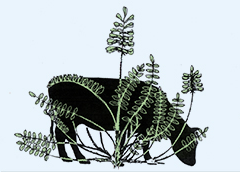Abstract
Larkspurs (Delphinium spp.) are a major cause of cattle losses in western North America, whereas sheep have been shown to be resistant to larkspur toxicosis. Goats are often used as a small ruminant model to study poisonous plants, even though they can be more resistant to some poisonous plants. It is not known how susceptible goats are to the adverse effects of larkspurs. In this study, we evaluated the susceptibility of goats to larkspur toxicosis by performing a dose-response study. We dosed goats with D. barbeyi collected near Cedar City, Utah at 3.3, 4.4, 6.6, 8.8 and 10.0 g plant material per kg body weight. None of the goats, at any of the doses, exhibited clinical signs typical of larkspur poisoning, including no observable muscle weakness. We conclude that goats are resistant to larkspur toxicosis, and thus it is very unlikely that goats would be poisoned by larkspur.
Recommended Citation
Welch, Kevin D.; Stonecipher, Clint A.; Gardner, Dale R.; Green, Benedict T.; and Cook, Daniel
(2020)
"An Evaluation of the Susceptibility of Goats to Larkspur Toxicosis,"
Poisonous Plant Research (PPR): Vol. 3, p. 19-27.
DOI: https://doi.org/10.26077/y7pp-q806
Available at:
https://digitalcommons.usu.edu/poisonousplantresearch/vol3/iss1/2
Included in
Beef Science Commons, Toxicology Commons, Weed Science Commons

